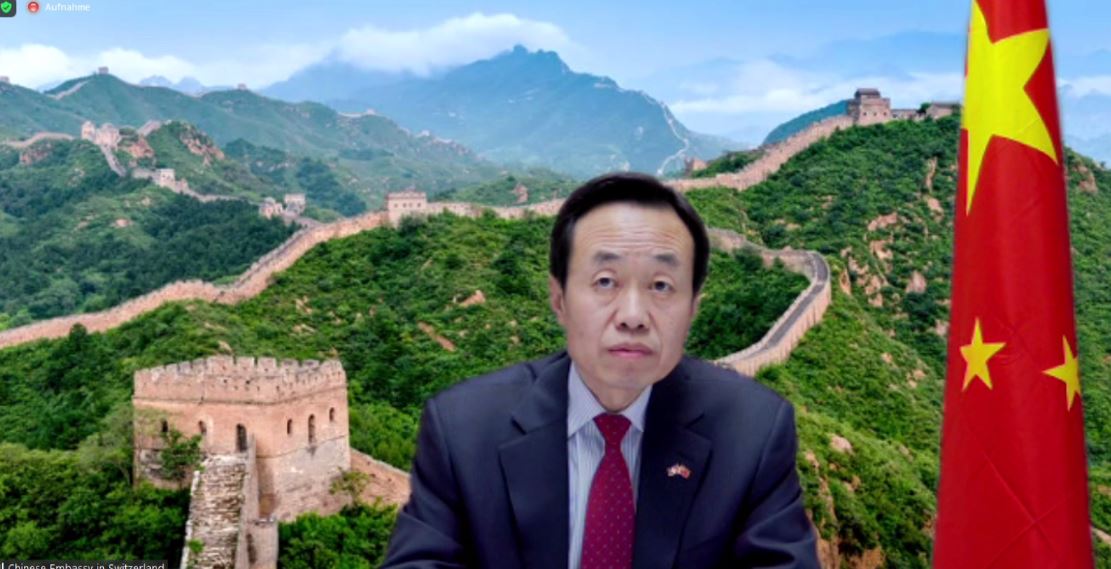
Pressure builds for a diplomatic boycott of Beijing Games

Switzerland will struggle to defy calls to skip the Winter Olympics if other democratic states decide to stage a diplomatic boycott of Beijing 2022.
The opening ceremony of any modern-day Games is, to quote the International Olympic Committee (IOC), an “extraordinary extravaganza” – a unique chance for the host country to pull out all the stops in a showcase of its history and culture. In the stands, presidents and prime ministers watch as the country’s head of state declares the Games open and white doves are released as a symbol of peace.
That rapturous audience of dignitaries, however, may well be downsized for the Beijing Winter Olympics next February, if a growing contingent of rights activists and politicians in the West have their way.
“What would be the effect if everyone is there applauding the Games without raising any concerns about human rights in China?” said Fabian Molina, a member of the Swiss House of Representatives and its foreign affairs committee. “I think now is not the time to celebrate in a country where crimes against humanity are taking place.”
Molina supports a diplomatic boycott of the event, which would see heads of state and other top officials stay away from the Games but athletes still compete. Rights groups are calling for the boycott as a way to protest “China’s reprehensible human rights abuses”. Among these they list the detention of Uighurs in the province of Xinjiang, the jailing of democracy activists in Hong Kong, and the plight of Tibetans.
“As long as there is no international outcry, China will continue to [repress rights],” said Christoph Wiedmer, whose Bern-based organisation, the Society for Threatened Peoples, is taking part in the boycott campaign.
So far the Swiss government has stayed mum about its intentions, as it seeks to preserve good relations with the Chinese. Foreign Affairs Minister Ignazio Cassis is even planning a visitExternal link to China before the end of the month to meet with his counterpart.
Switzerland is likely to want to see what other countries do first. The White House has reportedly been consulting allies about forgoing the Games amid lingering tensions between the US and China. A majority of parliamentarians in the United Kingdom, Canada and the European Union, as well as both Republican and Democratic members of the US Congress, are in favour of a boycott.
Global megaphone
Frustration among rights groups has been brewing for years. The IOC’s prediction that the 2008 Summer Games in Beijing would be a catalyst for human rights advances in China proved to be wrong, they said in an open letterExternal link to governments.
“In 2008 there was still some hope that things might improve,” said Wiedmer. “But this has changed dramatically since the arrival of [Chinese President] Xi Jinping”. Since Xi took office in 2012, there have been allegations of increased suppression of minority rights and freedoms in the country.
The Winter Games are a milestone event for the Chinese. Like the football World Cup, the Olympics are a megaphone for states to communicate with the world and their own people, according to Patrick Clastres, who teaches at the Institute for Sports Science at the University of Lausanne. The host country can “impose its singular history and values” during the opening ceremony, he said. The event usually draws hundreds of millions of television viewers worldwide.
“The host country will aim to fill up the officials’ box in the stands to show its influence and weight in international relations,” said Clastres, whose research focus includes sports diplomacy. China’s message in 2008, which it will again try to send in February, was that “human rights are just a Western invention”, said the professor.
Calls by rights campaigners for the IOC to strip Beijing of the Winter Olympics have gone unanswered, and a boycott by national teams appears to have little support worldwide. Dick Pound, a prominent member of the Lausanne-based world body, told the BBCExternal link that preventing athletes from competing would be “a gesture that we know will have no impact whatsoever.”
Activists are now ratcheting up pressureExternal link on governments to skip the Games. A boycott by Swiss dignitaries, said Wiedmer, “is the minimum we expect […] to not be complicit with the system of human rights violations of the Chinese communist party.”
Boycotting Beijing 2022 would show “the world has not forgotten the victims of the brutal repression in China,” said Molina, a Social Democrat.
“In diplomacy it’s important to give strong signals, and the Games is a moment to give them,” he added. “The international community should stick to the concept of human rights as it is, and not as China sees it.”
In 2014, heads of state from Germany, the United Kingdom, France and the US all stayed away from the Sochi Winter Olympics. The US delegation included instead former tennis player Billie Jean King, a prominent gay rights activist, seemingly in response to Russia’s much-criticised new law against homosexual “propaganda”.
Switzerland, on the other hand, sent its president to the Games.
Weighing the risks
Twice this year, Molina raised questions in parliament asking the Swiss government if it was prepared to forgo an official delegation in 2022 given what many scholars say amounts to crimes against humanity on the Uighur population.
In response, the Federal Council (executive body) refused to make any commitments but acknowledged that the situation in China for minorities and rights defenders “had deteriorated”. A decision on sending dignitaries to Beijing would be made at a later date, it added. The foreign affairs department gave a similar answer by email when contacted by SWI swissinfo.ch.
China slammed Switzerland in early 2021 for expressing concern about human rights in its first China foreign policy strategy. The Swiss later decided not to place sanctions on the Asian giant for its alleged actions in Xinjiang, as the US and the EU have done. Chinese officials have denied the existence of oppressive measures against Uighur Muslims and said camps set up in the province were for detaining extremists.

More
China lashes out at Swiss foreign policy strategy
“Switzerland pursues an independent foreign policy,” foreign minister Cassis recently told the newspaperExternal linkNeue Zürcher Zeitung. “We want to take a special path that lets us hold summits in Geneva like that between Joe Biden and Vladimir Putin”.
The Swiss also declined to sign a joint statement at the United Nations this autumn on the treatment of the Uighurs, just as the city of Zurich was hosting a high-level meeting between US and Chinese officials. Switzerland had signed similar declarations in previous years.
Playing a good offices role and bringing parties to the negotiating table, though an important part of Swiss foreign policy, should not come at the cost of failing to speak up when countries break international norms, said Molina. “As a small country, [we] depend on a stable international world order,” he said.
Cassis has also hinted that Switzerland wants to preserve good economic relations with China by avoiding any action that would upset the superpower. Bringing up human rights with the country’s third-largest trade partner was “a balancing act”, the minister told the NZZ.
China is known to retaliate when other states go against its wishes. It recently downgradedExternal link diplomatic ties with Lithuania after Taiwan opened a diplomatic office in the Baltic state. Australia sufferedExternal link trade restrictions from Beijing for supporting calls for an inquiry into the origins of Covid-19.
But, according to Patrick Clastres, the costs of a diplomatic boycott may not be all that high.
“[A diplomatic boycott] is a lesser blow that doesn’t weigh on trade or everyday political relations between countries,” he argued. “But symbolically it’s not insignificant.”
Keeping politics out of sports
Appeals for a boycott have received pushback from critics who say that this type of action would do nothing to improve the plight of Uighurs or Tibetans. Russia, which has already announced its president will attend the Games, calledExternal link talk of a boycott “nonsense”.
For its part, the Chinese foreign ministry told the BBCExternal link: “It is highly irresponsible for some parties to try and disrupt, intervene, and sabotage the preparation and holding of the Games to serve their political interests. Such actions will not be supported by the international community and will never succeed.”
In October IOC vice-president John Coates dismissed the idea of a boycott, saying his organisation had no business meddling in countries’ internal affairs.
“We are not a world government,” he told reporters.
As the West agonised over whether to stage a diplomatic boycott of the Beijing Winter Games, concerns emerged for the well-being of Chinese tennis player Peng Shuai. Shuai, a former Olympian, vanished from public view after she accused a former top Chinese government official of sexual assault. After an international outcry over her disappearance, Chinese state media circulated videos purporting to show she was well.
Shortly after, IOC president Thomas Bach held a video call with Shuai. According to an IOC spokesperson, the tennis star was fine but wanted privacy. The Women’s Tennis Association, which has repeatedly called for a full investigation into Shuai’s assault allegation and threatened to cancel future tournaments in China, was left unconvinced. Rights groups, meanwhile, criticised the IOC’s action, with Human Rights Watch accusingExternal link the world body of failing to safeguard the rights and safety of athletes and collaborating with Chinese authorities to undermine freedoms.
Swiss Olympic, the national Olympic committee, has statedExternal link that “it is difficult – impossible even – for [us] to have an influence on the political situation in China.”
“We can understand that China’s politics may lead to debates,” spokesperson Alexander Wäfler wrote in an email to SWI swissinfo.ch. “In our opinion, the Olympic Games help to keep a people-to-people communication channel open between […] different nations [that is] separate from politics.”
For Switzerland, keeping politics out of the opening ceremony of the Beijing Olympics may ultimately prove difficult. Molina believes that if other democratic countries boycott the Games, Switzerland may have to follow suit.
“It’s difficult to imagine the Swiss president or the sports minister going to Beijing without any other head of state from Western countries,” said the parliamentarian.
More

In compliance with the JTI standards
More: SWI swissinfo.ch certified by the Journalism Trust Initiative





























You can find an overview of ongoing debates with our journalists here . Please join us!
If you want to start a conversation about a topic raised in this article or want to report factual errors, email us at english@swissinfo.ch.